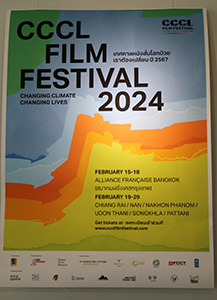
‘Changing Climate, Changing Lives’ awards top prize to Japan’s ‘Miwatari’
BANGKOK — “Welcome to the fourth CCCL Film Festival in Bangkok; I am so glad you made it.” There was a poignant element to the opening speech by Christopher Moore, founder of Bangkok’s “Changing Climate, Changing Lives Film Festival,” as he thanked participants and audience members for showing up.
The Thai government had warned citizens to stay at home that day because of extreme air pollution that gripped the Thai capital in mid-February, making the city of 11 million one of the most polluted metropolises in the world. The circumstances highlighted the growing importance of events that raise climate awareness, and the growing momentum around what began as a small, homegrown event.
Moore and his wife, Busakorn Suriyasarn, launched Bangkok’s climate change film festival in 2020 to enable young filmmakers to tell their stories, empower local communities and create support networks in Thailand. “The idea for the festival came to me when I looked at the gaps in the conversation around climate change,” says Moore, who is also a veteran writer of crime thrillers.
“I had read so much science and essays on the subject, but I had not seen a great deal of dramatization of the lives of the people affected. I was very much interested in the personal experiences of people in areas where climate change has already had an impact. Without the right stories, it’s easy for people to ignore the science, which does not really explain what is happening to people’s lives and livelihoods. Visual storytelling best encapsulates our dreams, fears and inadequacies when it comes to climate change action.”
The first challenge Moore faced was finances, “Who gives you money when you don’t have a track record? That’s the million-dollar question. So I approached two close friends and they came up with the budget for the first year. After that, we started looking for other partners — advocacy groups, [nongovernmental organizations], embassies, private individuals.”…
Read the full story here.


